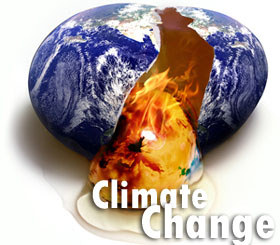Aid groups call Asia's disasters "wake-up call" on climate change
 Bangkok - Killer typhoons and floods in Asia over the past week have provided a timely "wake-up call" for world leaders to push through a new climate deal in December in Copenhagen, international humanitarian relief agencies said Tuesday.
Bangkok - Killer typhoons and floods in Asia over the past week have provided a timely "wake-up call" for world leaders to push through a new climate deal in December in Copenhagen, international humanitarian relief agencies said Tuesday.
"In the past week, the world has witnessed again how vulnerable, poor families in the Philippines, Vietnam, Thailand and India are bearing the brunt of climate change," said Richard Rumsey, World Vision's director of disaster risk reduction and community resilience.
The Philippines was hit by two typhoons last week, which went on to wreak havoc in Vietnam, Cambodia and Thailand while India has been inundated by floods after weeks of a severe drought.
Aid groups that have joined the UN-sponsored climate talks in Bangkok taking place this week and last said they were hoping these latest weather-related disasters would highlight the urgency of hammering out a deal on battling climate change at the Copenhagen meeting.
World Vision, a leading international relief agency, has seen its expenditures on responses to natural disasters increase from 15 per cent of its total expenditures in 1998 to 35 per cent in 2008, or from 90 million dollars in 1998 to 640 million last year.
According to UN statistics, nearly nine of every 10 natural disasters are now weather-related, and their frequency and intensity are on the rise.
"We've seen an increase in weather-related disasters from 200 [per annum] in the 1990s to 350 since the year 2000," said Madeleen Helmer, head of the Red Cross/Red Crescent Climate Centre, which was established three years ago to cope with the growing number of climate-related catastrophes.
Overall, the amount of money spent on "humanitarian response" has risen from 4 per cent of overseas development assistance in the 1990s to 9 per cent now, Helmer said.
The trend highlighted the need for the Bangkok climate talks to succeed this week, aid groups said.
The negotiations, which are to conclude Friday, aim at completing a "negotiation text" to be used at the climate change summit in Copenhagen.
Key issues on the table include getting a commitment from developed countries to drastically and swiftly reduce their carbon emissions over the next four decades to keep global temperatures from rising more than 2 degrees Celsius above preindustrial levels, a threshold above which catastrophic climate change is predicted.
Another key issue is to secure a commitment from rich countries to help fund efforts for the developing world - deemed the most vulnerable to weather-related disasters and rising sea levels - to adapt to and alleviate the effects of global warming.
The World Bank has estimated the global adaptation bill would be about 100 billion dollars, requiring a huge increase in overseas aid.
World Vision, in a report released Tuesday, argued that more expenditures on adaptation in developing countries, such as the planting of more mangrove forests to protect coastlines, could mitigate expenditures on emergency relief in the future.
"In many cases, these efforts contribute significantly to the resilience of communities before disasters hit as well as reduce death and destruction," Rumsey said, noting that research conducted by the United Nations indicated that every dollar spent on disaster risk reduction saves nearly 7 dollars in emergency response funds. (dpa)